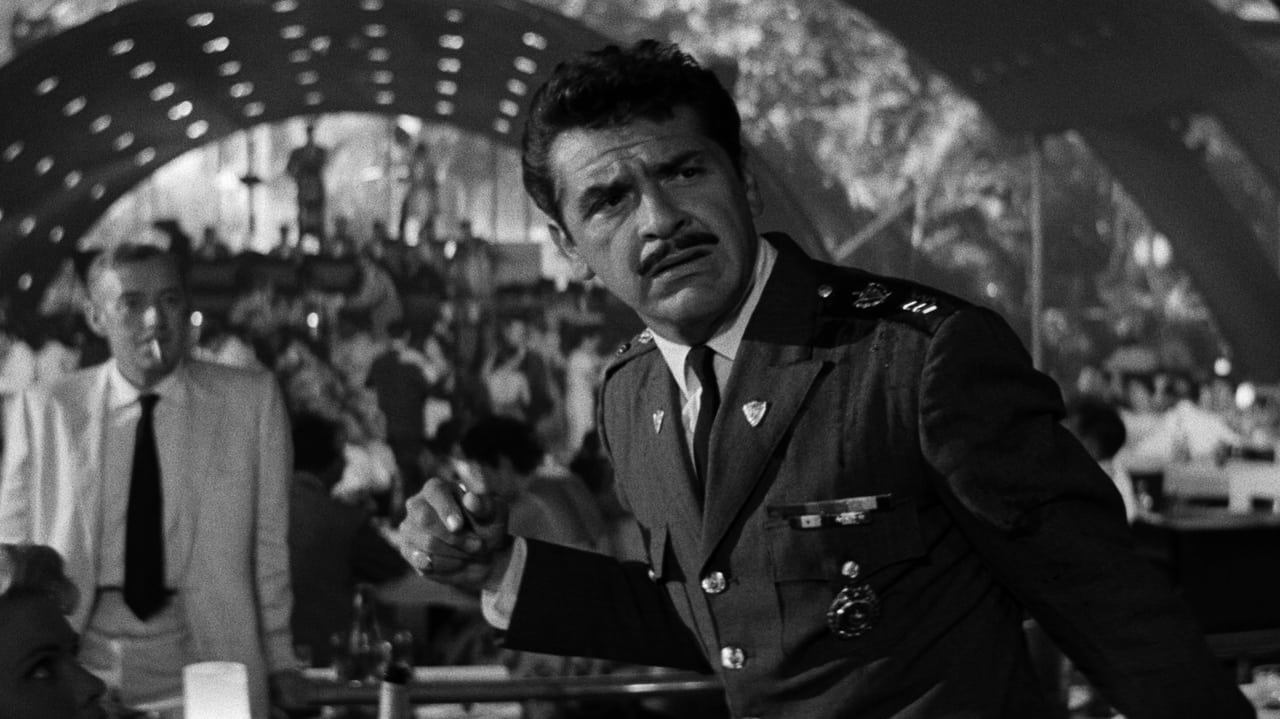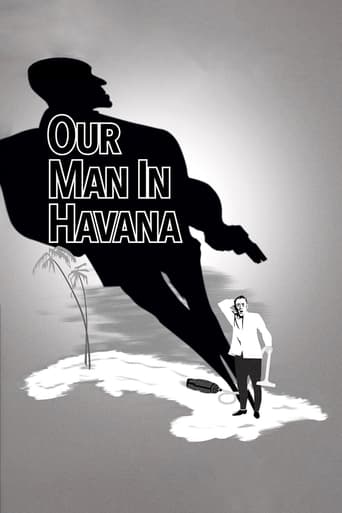

One of my all time favorites.
... View MoreIt's fun, it's light, [but] it has a hard time when its tries to get heavy.
... View MoreA Brilliant Conflict
... View MoreI really wanted to like this movie. I feel terribly cynical trashing it, and that's why I'm giving it a middling 5. Actually, I'm giving it a 5 because there were some superb performances.
... View MoreNot unentertaining, but blurred and bizarre. A bewildered Alec Guinness malfunctions in the middle of an off-centre international cast mixture with very little mutual rapport. The relationship between Guinness and his screen daughter Milly was a misalliance. For most of the film I thought she was being played by Britt Ekland. She seemed to have a funny accent. I never figured out what had happened to Alec's screen wife. Next was Burl Ives, blown in from Illinois via Prussia, having seen service in the German army in WWI. This would have been an achievement, since he wasn't born until 1909. I never really understood who shot him, or why. The hyper-gorgeous Maureen O'Hara appeared to be seriously misplaced as a secretary spy from London, and it was difficult to tell what she saw in Guinness, with whom she had no chemistry and whose general ineptness was only too obvious. Although it could also be interpreted, at a stretch, as supremely subtle subterfuge.Then we had Noel Coward, with his clipped tones, whose brisk and dapper presence stood out like a sore thumb in the sleazy purlieus of Havana. The most memorable comic part of this film was when, in the interests of security, he shut the al fresco door. I've remembered that scene for the last ten years at least. But if this was a comedy, then it was one of the oddest, with three unfunny assassinations, including an attempted poisoning in full daylight at the European Traders Lunch. Which side was the head waiter, Le Mesurier, on, I wonder ? One of the deaths was of a totally innocent air pilot we'd only glimpsed, a hapless victim of Alec's blundering falsehoods, which he got clean away with. Another victim was bundled up and dropped in the gutter outside the vacuum cleaner shop. I don't know what that was supposed to achieve. Who was the enemy, anyway ? It must have been the Russians; it always was in this era. Extraordinary to read that Castro actually attended some of the film's shooting. The most sympathetic character was the police captain, known as the red vulture, who only tortured people by mutual agreement. In the end he mercifully deported Guinness and his daughter back to London, where they were given their just deserts. Milly was finally seen fondling a white Jaguar. A curious send-up of the phony spy set-up, fully fit to compete with the one who came in from the cold.
... View More"Our Man in Havana" has all of the elements of a sure-fire classic: a cast that includes Alec Guinness, Burl Ives, Noel Coward, a very lovely Maureen O'Hara and Ralph Richardson; a screenplay by Graham Greene adapted from his own novel; and direction by Carol Reed, who had tackled Greene before and made one of the best films in history ("The Third Man").So why doesn't "Our Man in Havana" entirely work? I'm not sure, but I found myself wanting to like this movie far more than I actually did. Guinness plays a vacuum cleaner salesman living in Havana who gets recruited by the British secret service to do spy work for them. He doesn't want to be a spy but wants the fat paychecks that come with it, so he feeds them fake information to avoid having to do any actual work. But when very real consequences arise from his false information, he suffers a moral crisis.And maybe that's where the movie stumbles. That moral crisis is never made explicit, and the movie gets sidetracked into a revenge storyline as Guinness plans the murder of another agent out to get him. The film isn't as playful as the book, so it's not very funny when it should be, but since it doesn't examine the more serious themes inherent in the story as thoroughly as it could, there's nothing to fill the gap where the humor used to be.This film isn't exactly a misfire, but it's certainly no "Third Man."Grade: B
... View More"Our Man in Havana" is a underrated, but brilliant film. Alec Guinness as ever, is excellent, as is Noel Coward and Ralph Richardson.The re-voles around Jim Wormold(Alec Guinness) as a vacuum cleaner salesman in pre-revolutionary Havana. Here he meets Hawthorne(Ralph Richardson) a recruiter of spys. He wants Wormold to spy for Britain, and to recruit a "network" of secret agents. Having no idea on how to recruit an agent, Wormold simply invents a list of spys, and makes up information his "spys" are supposed to have discovered. Of course it all gos terrible wrong, and at the end of it, you suddenly realise you have been watching an extremely funny black comedy.A must see film.
... View MoreIt doesn't quite work. It should, since Graham Greene himself has adapted his novel for the screen, but there is something lacking. The jokey tone between comedy of the black variety and tragedy, or at least drama, sits somewhat uneasily between satire or black comedy or drama or a combination of all three. Still, this Graham Greene adaptation, directed by the great Carol Reed, offers several pleasures. It's a good yarn, this tale of a mild-mannered vacuum-cleaner salesman, English but domicile in Cuba, talked, rather too easily, I felt, into becoming a spy and who then invents tales of espionage in order to keep his easily earned salary rolling in. It's a dangerous game he's playing; we know it even if he's oblivious, so it comes as no surprise to us when things take a darker turn and finally people start to die for real.On paper, Greene's smart, quick-witted turn of phrase made the change in gear from a sharp, satirical jab at the espionage novel to something closer to the truth, believable. Too many espionage novels trade in clichés whereas Greene's, which wasn't really about spying at all, showed just how dirty a business it could be when reality intervened. He declared it 'an entertainment' and, while it was certainly entertaining, it was also realistic. Reed's film version isn't realistic, not the situation and not the characters.I never, for a moment, believed in Alec Guiness' Wormold; not in the easy-going way in which he took to the task in hand like a duck to water nor in his later development of a conscience. Alec Guiness is a fine actor, one of the finest, but he isn't Wormold and I think, fundamentally, it's Guiness' performance that lets the film down. Nor did I believe in Maureen O'Hara's 'secretary', a very unlikely bit of romantic interest. O'Hara is beautiful and she is feisty but she is also dumb and hardly the agent to keep Wormold in line. For the film to work, these are the characters we must believe in above all others. It's up to them to persuade us that all of this could happen; that it isn't just 'a joke', but somehow it's beyond the players and I was never convinced.The supporting players, on the other hand, are splendid. Ernie Kovacs graduated from a good comic actor to an excellent serio-comic actor with this movie and, as the doctor who finds himself an unwilling as well as an unlikely 'spy', Burl Ives is as good here, if not better, than he was in "Cat on a Hot Tin Roof" or "The Big Country". As the film's 'real' spies Ralph Richardson and, especially, Noel Coward are marvellous although it is they who take the brunt of the satirical jibes; Richardson mixing up the East and the West Indies and Coward sauntering through Havana like a London City gent complete with obligatory umbrella. Coward gets the film's best lines and he delivers them superbly. For these players alone the film is worth seeing and Oswald Morris' excellent wide-screen black and white photography certainly brings the place to life. It's just that, funny as they are, the jokes are out of place. Now, if only John Le Carre had written this.
... View More